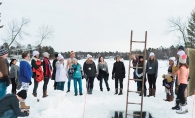On April 22, Earth Day events will be held worldwide to demonstrate support for environmental protection. It’s a fitting time to catch up with Kristin Klemetsrud, project lead for the Main Street Stillwater Independent Business Association’s S.E.E.D. (Stillwater Eco-Empowerment Directive) program.
“I think it’s important for the community to know just how much their local businesses do care about the vitality and longevity of their town, and how hard they work to take positive steps to make that happen,” Klemetsrud says.
What are the goals of the S.E.E.D. project? Our goal is to make it easy for small businesses to implement new or better recycling and composting programs. Independent businesses are invested in their communities, so making our businesses more “green” only makes sense. This program is a vehicle to help dispel some of the objections that might be on the minds of businesses that either don’t know [what to do] or think they can’t afford to [improve what they’re doing now].
Why now? Lots of change is already afoot in Stillwater, from the new bridge to bike and hiking trails. We saw this as a time to include long-term sustainability efforts, with the county offering both educational and financial support.
What are the long-term benefits? The immediate benefit is to be more sustainably aware and quite possibly to reduce the expense of trash collection. As we create momentum, we can hopefully support and encourage more efforts in stewardship of our resources.
What can local businesses do? [First] sign up for an assessment of your current practices. These assessments are offered completely free of charge by Waste Wise. Waste Wise will recommend improvements and assist in accessing additional funding. Individual business grants are available (up to $10,000), and Waste Wise will also work with each business to apply for appropriate funds. These grant dollars can be applied to hard goods (waste bins, compactors, labeling, compostable food containers, etc.) and educational training for employees.
Who is eligible to participate? This program is new and innovative. We can potentially receive funding for three to five years to continue this program. We are not limited to any particular business type or size. Our area of focus is Washington County, but it will take us some time to fan out from the downtown [Stillwater] area.
what is a good first step for businesses wanting to be more “green?” A relatively easy start is to label bins clearly to distinguish recycling versus composting. Educating employees so they can confidently follow through is also a good first step.
It’s more than just recycling? Yes, recycling is something everyone can do, and many do already. But it is not the only thing we need to consider if we truly want to be a community that honors the spirit of sustainability. Being a sustainable population means we consider all of our natural and human resources.
What are the long-term benefits? Raising awareness. Working in collaboration with like- minded organizations also strengthens community bonds and a willingness to work together on other issues that affect our public domain.
How can Stillwater’s success impact other communities? If our momentum can inspire another organization or community to participate as we have, that would also help us ... we’d be grateful to share what we’ve learned, and to learn from other creative minds.
BizRecycling Sessions:
8:30–9:45 a.m. April 8, Reve Bistro, 200 E. Chestnut St., Stillwater
5–6:30 p.m. March 24, Pub 112, 112 Main St. N., Stillwater
IBA Meetings: 9 a.m. alternate Fridays, Dock Café, 425 Nelson St. E., Stillwater
Main Street Stillwater Independent Business Association: 612.709.5511









